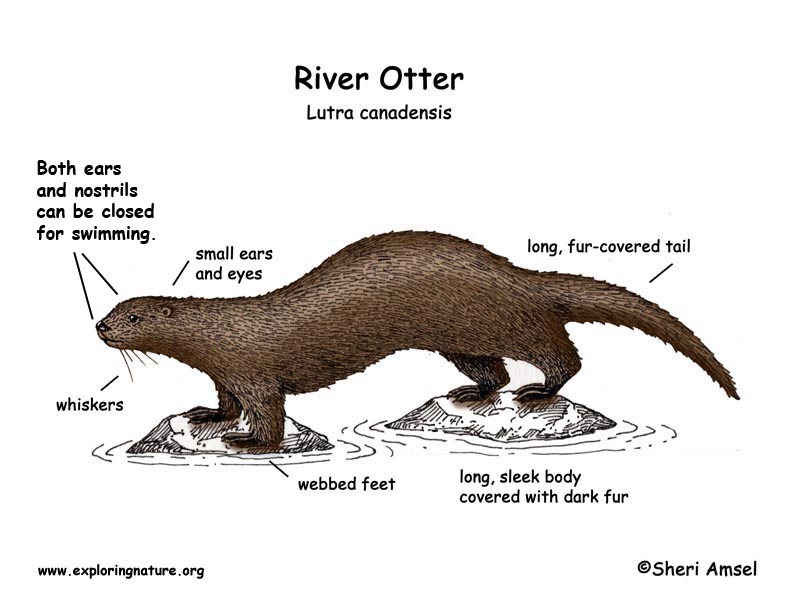

River otters were once common throughout Canada and most of the United States, except in desert areas. They are gone from much of the Midwest now, though some states are trying to re-introduce them.
They are rare in the rest of their habitat, which includes fresh and coastal waterways, swamps, lakes and marshes.
They can reach over 4-feet long and weigh from 10 – 30 pounds. They are built for life in the water with a long, sleek body, webbed feet and dense, oily fur that protects them from the cold. They are excellent swimmers and can stay under water for many minutes. They have nostrils that can close when under water and long whiskers for detecting prey.
They live in dens often with underwater doorways. They live alone, except when mating or females with young. They are playful, often sliding into the water down mud or snow banks.
They must eat a lot to stay warm and energetic. They eat fish, frogs, turtles, crayfish, crabs, birds, eggs, and small mammals, usually hunting at night.
Their main predator is man.
They breed just once a year. Females are pregnant for 2 months (gestation) and have 1 - 6 babies at any time of year, but mostly in the early spring.
River otters can live up to 10 years in the wild. They are rare in much of their range. They are listed as Lower Risk - least concern.
Kingdom: Animalia
Phylum: Chordata
Subphylum: Vertebrata
Class: Mammalia
Order: Carnivora
Suborder: Caniformia
Family: Mustelidae
Subfamily: Lutrinae
Genus: Lontra
Species: Lontra canadensis
When you research information you must cite the reference. Citing for websites is different from citing from books, magazines and periodicals. The style of citing shown here is from the MLA Style Citations (Modern Language Association).
When citing a WEBSITE the general format is as follows.
Author Last Name, First Name(s). "Title: Subtitle of Part of Web Page, if appropriate." Title: Subtitle: Section of Page if appropriate. Sponsoring/Publishing Agency, If Given. Additional significant descriptive information. Date of Electronic Publication or other Date, such as Last Updated. Day Month Year of access < URL >.
Amsel, Sheri. "Otter (River)" Exploring Nature Educational Resource ©2005-2024. December 13, 2024
< http://exploringnature.org/db/view/Otter-River >

